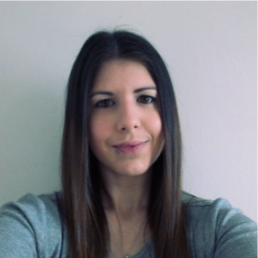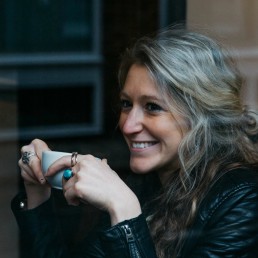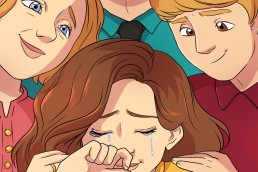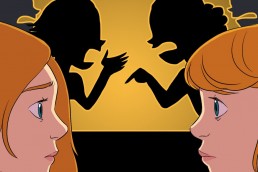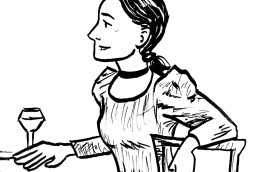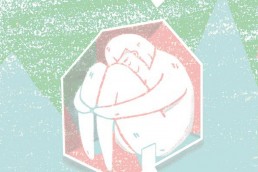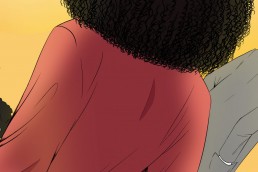Emily Holmes and Hope Virgo
I was having a really difficult time and looking through Twitter for mental health support when I came across Hope Virgo, an author and advocate for people with eating disorders. Meeting Hope’s words, I felt an instant connection and recognised a shared passion for pushing for more mental health support in education. I ordered Hope’s book, “Stand Tall Little Girl”, and it didn’t leave my side for some time afterwards.
In her book, Hope talks about her life from early childhood to the present in a very honest account of what life felt like for her in her own head as well as for her family. It’s a raw retelling of her personal journey in which she doesn’t just write herself, but also includes contributions from her mum.
Reading Hope’s words, I realised we don’t always have to only connect with people whose struggles are labelled the same as our own. I have Borderline Personality Disorder (BPD) and an anxiety disorder, yet Hope’s wisdom is helping me make positive steps, even though our experiences differ through diagnosis.
Following on from reading Stand Tall Little Girl, I was intrigued by Hope’s journey, then lucky enough to get the chance to ask this brilliant writer a few questions. I think anyone on a mental health journey will benefit from Hope’s answers, just as I continue to.
-O-
Emily: It was interesting that you chose to include discussions from your mum in your book. I think, like many other people around us, opening up to family can be harder than to a stranger, especially those we live with.
Hope: I hid it from my family for around 4 years before I got any help and even then I still tried to hide things from them. The hours of exercising in my room, hiding food in my pockets, and making myself sick in the bathroom I did secretly. There were points I wanted to ask for help. Points when I thought there might actually be something wrong with me but I didn’t really know. Since being in hospital I have learnt to talk about things and especially open up if I have a bad day. I now try to do that and have people around me who I do that with.
One of the trickiest things was when I relapsed — I felt I had let my family down so I didn’t feel able to tell my family. I thought I had let them down. That was another learning curve for me in my recovery.
Emily: What was the significance for you in having your mum contribute?
Hope: I wasn’t sure about my mum’s contribution but I am so pleased I added it in. I think it is so important to get her perspective on it and actually offer advice and hope to parents of those suffering. It was a great thing for our relationship too. We talked about everything and grew stronger through sharing the story.
Emily: There is a lot of shame attached to mental illness; we can feel like there is something wrong with us, and isolate ourselves, but by allowing safe spaces for conversation we allow friends and others we come across to feel safe when opening up. I have found that writing really enables me to clear my head and organise my thoughts. I have also found it helps me to identify positive choices I am making and those that may be causing me more harm. Your book is very honest, and at times really sad. Was it a shock when you started writing and documenting how ill you were, how bad things had really got?
Hope: Sort of. I knew I wanted to share my story and help others but also I guess I didn’t entirely think of the whole effect. I found some of the book hard to write but also therapeutic seeing how far I had come and also it reminded me that I didn’t want to get unwell again.
I remember when I wrote about some of my habits when I was sick, such as the vomiting and exercise, I was worried what people would think but I knew I had to get over that. And plough on. And do it. I have learnt to not be ashamed of my anorexia.
Emily: What effect has writing this book had in terms of contributing to your recovery?
Hope: It helped me to realise I 100% want to stay well. I have had the chance to meet so many amazing people along my journey and share my story, learn from others and be a part of some exciting work that Shaw Mind are doing! So yes I think [it’s had] a hugely positive impact.
Emily: Struggling with our mental health can make us feel extremely lonely. But with (at least) 3 people in every classroom struggling with their MH, you are definitely not alone. You do a lot of work around education and awareness in schools and universities, what would you say to someone struggling in school that feels like they don’t know where to go for help?
Hope: Try and open up to your friends. It is amazing the support that friends can give. And the trust you have with them. And more often than not they know something is going on for you.
If you don’t feel comfortable doing that go to your GP and be honest — make sure you don’t leave until there is an action plan in place!
The internet — websites like The Mix, Shaw Mind Foundation and blogging websites are what help me.
Emily: As well as being an advocate for mental health and recovery, you are also a keen runner! I’ve found exercise has really helped me to stay focused and given me something for me. For some people that’s yoga, or team sports, but these don’t always start out as positives and can quickly become as much a part of the issue as cutting out food, for example. You used to use exercise as a control mechanism and it became a large part of your eating disorder. You managed to turn this around and although you still run marathons and exercise you do this in a much healthier way. Has this been a difficult transition?
Hope: Yes at times and if I am honest I have to still manage this. Exercise is a huge trigger for me and sometimes I do still work out too much and push myself too hard. But through the help of a PT I have learnt more about exercising in a healthy way and eating the right food. I now make sure I vary my workouts, eat enough after them and have rest days.
-o-
It’s often positive to share experiences of support with those who’ve been there too so we can support and guide each other. Whether an eating disorder, depression, anxiety or any other mental health concern, the advice given by Hope can work across varying mental health diagnoses.
As a last thought, I asked Hope what was the one thing she wanted to cover in this article about eating disorders specifically. Hope replied that eating disorders often focus on someone’s weight, but just because someone doesn’t look ill, or seem extremely underweight, it doesn’t mean they aren’t struggling with food and/or their body image; this appearance myth needs to be challenged in order for people to get the support they have a right to access.
At the end of the day, whatever we’re battling can feel as though it strips us of who we are. By forging connection together we can challenge fears and start to rebuild ourselves, surrounded by those who have been broken too.
Emily Holmes
Emily Holmes is 28 and from Sheffield. She has diagnoses of Borderline Personality Disorder and Generalised Anxiety Disorder. Emily works in Children’s Services and studies Education, Culture and Childhood at the University of Sheffield. Emily loves writing, running, cats and anything fitness related.
Hope Virgo
Hope Virgo is the author of Stand Tall Little Girl and a leading advocate for people with eating disorders. Hope helps employers such as schools, hospitals and businesses deal with the rising tide of mental health issues. She is also a recognised media spokesperson having appeared on various shows including BBC Newsnight, Good Morning Britain, Sky News and BBC News.


